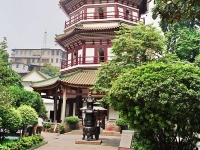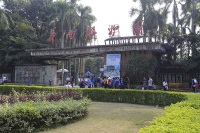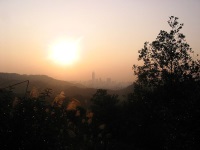Guangzhou Travel Guide
Guangzhou is a booming metropolis along the South China Sea, where shimmering skyscrapers rise above centuries-old temples and well-preserved historical districts. Located next to Hong Kong and Macau, it was formerly known in the West as Canton and was historically a trading hub that functioned as a major terminus on the maritime Silk Road. Today, the city remains focused on industry and commerce, and there are vast business and trade enterprises.
Culturally, visitors will encounter many unforgettable attractions, such as the Temple of the Six Banyan Trees, the Guangdong Folk Arts Museum and the Museum of the Western Han Dynasty. Cantonese food and opera are highlights of the Guangzhou social scene, and some of the best shopping areas are Shangxia Jiu Lu, Beijing Lu and Renmin Nan Lu.
Travellers to Guangzhou will probably find the summer season a bit hot and rainy, but the winters, from December to March, are mild and sunny and a wonderful time to explore this fascinating destination. There are a number of buses and taxis to transport tourists in the city, along with frequent flights and trains from Guangzhou to other major Chinese destinations such as Beijing and Shanghai. The city is well equipped to accommodate its more than 100 million annual visitors, and presents a great balance between historical intrigue and modern indulgence.
Things to do in Guangzhou
Guangzhou is filled with sites that will captivate all visitors, including historic religious structures, an array of interesting museums, and some beautiful parks and gardens. The ChimeLong Group offers exciting theme parks set up for visitors to enjoy with circuses and waterparks, while the Guangdong Museum provides a good overview of the region and its history. The Guangzhou Museum of Art is one of the best in China, and has impressive exhibits of traditional Chinese calligraphy and paintings. Other favourites include the Guangdong Folk Arts Museum, situated in the Chen Clan Ancestral Hall, and the Museum of the Western Han Dynasty, which includes the Mausoleum of the Nanyue King.
Guangzhou has a unique tourist attraction in Shamian Island, a former colonial outpost. The European architecture and manicured lawns are dotted with shops and cafes, making it a relaxing refuge from the bustle of the city. The Temple of the Six Banyan Trees is another popular Guangzhou attraction, an oasis of peace in the city.
For those who like outdoor activities there is the South China Botanical Garden and the beautiful Baiyun Mountain. Another exciting attraction, especially for those travelling with children in Guangzhou, or who just particularly like animals, is the Chimelong Safari Park, where China's beloved Giant Pandas can be observed.

Chimelong
Chimelong Paradise is one of China's largest amusement parks and is recognised internationally as a quality establishment, with one of its rollercoasters even being featured in the Guinness Book of Records. The park has more than 100 rides and is guaranteed to delight thrill seekers and kids of all ages. The water world section boasts one of the largest water stunt shows in the world and is a famously enjoyable place to spend a sunny day.
The Chimelong International Circus is said to be the world's largest permanent circus and the theatre can hold nearly 7,000 people. This show is wildly popular and it is recommended that visitors book their tickets in advance, especially if going over the weekend. The Chimelong International Circus includes award winning acts from all over the world and its set, lighting and costume design are sublime. Chimelong certainly tops the list when it comes to family attractions in Guangzhou.

Temple of the Six Banyan Trees
A must-see attraction in Guangzhou is the impressive Temple of the Six Banyan Trees. This ancient Buddhist structure was built around the year 537, and still attracts many local and foreign visitors. Aside from its three famous Buddha statues, one of the temple's best features is the magnificent statue of Kuan Yin, the Buddhist bodhisattva associated with compassion and mercy. The nearby six-story Flower Pagoda is a beloved landmark, with its distinctive petal-like layers and rich collection of cultural treasures. The temple is surrounded by some lovely gardens that add to the impression of it being a centre of serenity in a bustling city.

South China Botanical Garden
The South China Botanical Garden is stunningly beautiful and varied, and one of the largest in the country. It's divided into three areas: a nursery and arboretum, which house modern conservatories and over 30 specialised gardens; a research and residential zone; and Dinghushan Nature Reserve, which was the first national nature reserve in China. The South China Botanical Garden has a plethora of local flora for visitors to admire, including collections of magnolias, orchids and medicinal herbs, as well as bonsai, bamboo and endangered plants. Long Dong Magic Forest is a particularly special attraction, as it is one of the top eight scenic spots in Guangzhou. Non-botanical attractions at the gardens include the Science Education and Information Centre and Guangzhou's Oldest Village, which was rebuilt on Neolithic ruins.

Baiyun Mountain
Baiyun Shan Mountain is a popular tourist attraction just outside of Guangzhou, with the lofty vantage point providing phenomenal panoramas of Pu Valley, the Nengren Temple and the sprawling cityscape of Guangzhou. There are cable cars running for just over a mile (1.7km) between Yuntai Garden and Peak Park, the park itself consisting of 30 peaks and covering over 17 square miles (28 sq km). It's stunningly beautiful, with well-maintained gardens, numerous temples and a sculpture park, and time here is best spent walking along the winding paths up in the clear mountain air and relishing a break from the city. As with most monitored nature areas in China, visitors are sadly not really given the freedom to wander, hike or picnic beyond the paths.
Getting Around
There is an efficient and expanding public transportation system that makes getting around in Guangzhou relatively simple. The Yang Cheng Tong card, available from convenience stores throughout the city, offers discounted travel using local buses, subways, and even some taxis. The subway covers much of downtown, and the stations are clearly marked with the Guangzhou Metro logo. The bus system has a more comprehensive service, but is slow if passengers are travelling long distances. Buses require exact change or a Yang Cheng Tong card.
Taxis are a popular form of transport in Guangzhou for visitors, as they are cheap and reliable. Many drivers will not speak English, however, so it is best to have the destination written in Chinese to show them. Renting a car is possible, but driving in the downtown area can be confusing and possibly dangerous for those unfamiliar with Chinese, as the road signs are not in English.
China has a reputation for being bicycle-friendly, but Guangzhou does not have necessary amenities such as bicycle lanes. Travellers can rent a bicycle on Shamian Island, but for longer stays it is preferable to buy one, as rentals are often in bad repair. It is also possible to explore some areas of the city on foot, but the various districts are far apart.
Guangzhou Climate and Weather
Guangzhou is part of the Pearl River Delta and has a humid subtropical climate. The city is situated just under the Tropic of Cancer and the generally pleasant weather is a big advantage for travellers. Guangzhou has fairly good weather year round with a generally warm and humid climate. As with most of China, the four seasons are distinct. Summers (June to September) are wet, humid, and hot, and winters (December to March) are mild and dry. Springs and autumns are temperate and very pleasant, but as spring is prone to rain, autumn (September to early December) is probably the best time to visit Guangzhou. The daily mean temperature range is from 57F (14C) in winter to 84F (29C) in summer. Guangzhou does experience the Asian monsoon and actually has a lengthy monsoon season from April to September. The heat and humidity can be a bit overwhelming in summer and good sun protection is required if travellers are visiting at this time.
China travel info
Electricity
Electrical current is 220 volts, 50Hz. Plug types vary, but the two-pin flat blade and oblique three-pin flat blade plugs are common. Adapters are generally required.
Language
The official language is Mandarin Chinese, but there are hundreds of local dialects.
Money
China's currency is the Renminbi Yuan (CNY), which is divided into 10 jiao or 100 fen. Cashless payments via smartphone applications such as WeChat Pay are increasingly commonplace in main cities, and major credit cards are widely accepted. ATMs are widely available in major cities. It is not possible to exchange Scottish or Northern Irish bank notes; banks are closed on weekends.
Tipping
Tipping is not officially recognised in China, though the practice is has become increasingly common among tour guides, top-end restaurants, tour bus drivers and hotel staff. Travellers wanting to tip should leave a gratuity of about 10 percent. Large hotels and restaurants often include a service charge in their bills, usually of around 10 percent, so travellers should make sure that they aren't doubling up.
Health
A yellow fever vaccination certificate is required from travellers coming into China from infected where there is a risk of transmission. There is a risk of malaria throughout the low-lying areas of the country, and it is recommended that travellers to China seek medical advice about malaria before departure. All eligible travellers should be up to date with their COVID-19 vaccines; vaccinations are recommended against hepatitis A and hepatitis B, typhoid (not necessary if eating and drinking in major restaurants and hotels), Japanese encephalitis (usually only recommended for rural areas), and rabies (only recommended for travellers at risk of animal bites). Tap water shouldn't be drunk unless it has first been boiled, filtered or chemically disinfected. Street food should be treated with caution. High levels of air pollution in major cities and industrialised areas in China may exacerbate bronchial, sinus or asthma conditions. There is generally a high standard of health care in major Chinese cities, but it is not provided free of charge; travellers are advised to have comprehensive travel health insurance.
Safety
China is one of the safety countries to visit in Asia. Serious crime against foreigners is rare but does occur, particularly in isolated or sparsely populated areas. If travelling alone, including following parts of the Great Wall, it is advisable to leave an itinerary and expected time of return with a third party. Travellers should take extra care in street markets and at tourist sites, which attract thieves and pickpockets, and around the popular expat bar areas at night, where lone foreigners have occasionally been targetted. Travellers should be cautious about using pedicabs in Beijing, as tourists have reportedly been mugged by the drivers. Disputes over taxi fares can occur. Passengers should insist on paying the metered fare and should ask for a receipt; this has the taxi number on it.
Seasonal heavy rains and typhoons cause hundreds of deaths in China each year, particularly those areas bordering the Yangtze River in central, southern and western China. Demonstrations have taken place in Lhasa, Tibet, as well as in some Chinese provinces in protest against Chinese rule in Tibet. Even though the situation seems to have stabilised, visitors are advised to stay up to date on the situation before travelling to the region and to avoid all protests. The Chinese government sometimes suspends the issue of permits for travel to Tibet due to unrest.
There is currently little threat from global terrorism. The risk of terror attacks is higher in the Xinjiang Uyghur Autonomous Region and travellers should exercise caution if travelling to or around Xinjiang.
Local customs
Chinese people usually have three names, the first of which is their surname, or family name. As a result, visitors should be prepared for hotels mistakenly reserving rooms under their first names. For clarity, surnames may be underlined. When addressing Chinese people, the surname should come first and official titles should be used. Chinese handshakes last longer than those in western countries, and it is customary to stand close together when in conversation. Politeness in western terms is often foreign to the Chinese, and they rarely bother with pleasantries. It is considered disrespectful to keep prolonged eye contact, avoiding eye contact is considered reverential rather than rude. All foreigners should carry their ID on them at all times, as spot checks are common. Failure to show evidence of ID when requested by an official may result in a fine or detention.
Doing business
The Chinese are strict timekeepers and being late for a meeting is considered rude. When meeting people for the first time it is normal to shake hands and say 'ni hao', which means 'how are you'. Handshakes generally go on for longer in China than in most western countries. Business cards are commonly exchanged at the start of meetings in China; it is customary to have one side printed in Chinese and one in English. When giving or receiving business cards or a gift, it is customary to hold it with both hands. Chinese consider gifts an important show of courtesy. Decision-making may take longer than expected during negotiations. During a meal or reception, a host is likely to offer a toast; foreigners may be expected to offer them one in return.
Women are generally treated with respect and courtesy when doing business in China and it is increasingly common to find Chinese women in senior positions, especially in the big cities. Businesswomen should, however, avoid showing too much skin. Business dress for both men and women tends to be conservative and plain without much ornament or bright colour.
Business hours are 8am to 5pm, Monday to Saturday. A five-day week is more common in larger cities and international companies. Workers usually take their lunch break between 12pm and 2pm and it is not unusual to find offices empty during this time.
Duty free
Travellers to China do not need to pay customs duty on 400 cigarettes or 100 cigars or 500g of tobacco; 1.5 litres of alcohol; perfume for personal use; and personal articles up to the value of CNY2000. Prohibited goods include arms, ammunition, or printed material that conflicts with the public order or moral standards of the country. Also prohibited are radio transmitters and receivers, exposed but undeveloped film and fresh produce. Strict regulations apply to the import and export of antiquities, banned publications, and religious literature. All valuables must be declared on the forms provided.
Communications
The international dialling code for China is +86. Hotels, cafes and restaurants offering free WiFi are widely available. As international roaming costs can be high, purchasing a local prepaid SIM card can be a cheaper option.
Passport & Visa
There are a few complex exceptions to Chinese visa requirements, which will not apply to the majority of visitors, but all requirements should be confirmed with a Chinese embassy before travel. All documents necessary for further travel and sufficient funds to cover intended period of stay are required; travel to Tibet will require a special Tibet Entry Permit. It's recommended that passports be valid for six months after intended period of travel.
Entry requirements
US nationals require a passport that is valid for six months after the date of departure. A visa is required for entry into China.
UK nationals require a passport that is valid on arrival for six months after the date of departure. UK Emergency Travel Documents (ETDs) are accepted for entry, airside transit and exit from China. Travellers may need to show a police report indicating how they lost your full passport. A visa is required for entry.
Canadians require a passport that is valid for six months at the time of entry. A visa is also required.
Australians require a passport valid on arrival, and a visa for entry to China. A valid visa is required.
South African nationals require a passport valid on arrival, and a visa for entry to China.
Irish nationals require a passport valid on arrival, and a visa for entry to China.
New Zealand nationals require a passport valid on arrival, and a visa for entry to China.
Useful contacts
Ministry of Culture and Tourism, Guangxi: +86 773 288 5326, www.topchinatravel.com/
110 (Police); 120 (Ambulance)Embassies / consulates in other countries
Chinese Embassy, Washington DC, United States: +1 202 495 2266.
Chinese Embassy, London, United Kingdom: +44 (0)20 7299 4049.
Chinese Embassy, Ottawa, Canada: +1 613 789 3434.
Chinese Embassy, Canberra, Australia: +61 (0)2 6228 3999.
Chinese Embassy, Pretoria, South Africa: +27 (0)12 431 6500.
Chinese Embassy, Dublin, Ireland: +353 (0)1 219 6651.
Chinese Embassy, Wellington, New Zealand: +64 (0)4 473 3514.
Embassies / consulates in China
United States Embassy, Beijing: +86 (0)10 8531 3000.
British Embassy, Beijing: +86 (0)10 5192 4000.
Canadian Embassy, Beijing: +86 (0)10 5139 4000.
Australian Embassy, Beijing: +86 (0)10 5140 4111.
South African Embassy, Beijing: +86 (0)10 8532 0000.
Irish Embassy, Beijing: +86 (0)10 8531 6200.
New Zealand Embassy, Beijing: +86 (0)10 8531 2700.



